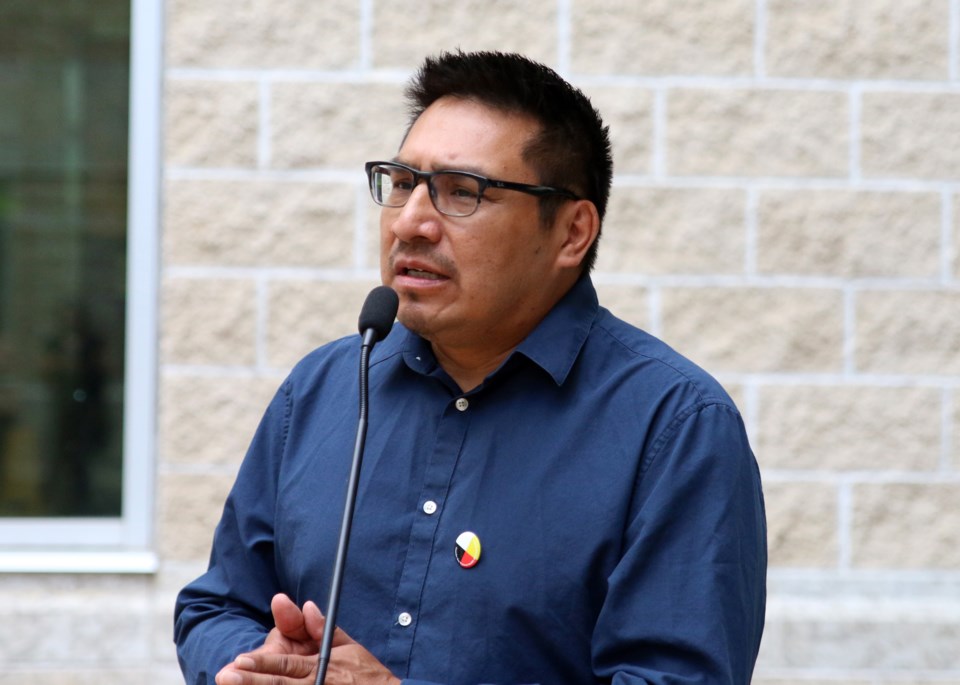Kiiwetinoong MPP Sol Mamakwa is not only travelling to Alberta to meet with Pope Francis, but taking an important message with him. Written on a birch bark scroll, Mamakwa carried the words of residential school survivors, calling for the revocation of the so-called “Doctrine of Discovery.”
The Pope is visiting Canada as part of his “penitential pilgrimage” as he called it.
On July 25, the Pope visited the site of the former Ermineskin Indian Residential School in the community of Maskwacis, Alta., and will continue to Quebec City on Wednesday and Iqaluit on Friday.
At the site, the Pope expressed his “sorrow, indignation and shame.” He offered an apology to the children who attended the schools, those who were punished for speaking their languages and practising their culture, who were separated from their families and, in many cases, subjected to psychological, physical and sexual abuse.
“I am deeply sorry,” said the Pope, “I am sorry, and I ask forgiveness.”
But the visit is evoking complex feelings among many Indigenous people, both survivors and the children of survivors, said Mamakwa.
The complex feelings, and the intergenerational trauma the institutions are said to have caused make it difficult for some to forgive, he said, noting that every survivor, including himself, is at a different stage of their healing journey.
In addition to his role as MPP, Mamakwa is the deputy leader of the official opposition and serves as critic for both Indigenous and Treaty Relations as well as Northern Development. He was one of the estimated 15,000 First Nations, Métis and Inuit children who were forced to attend residential schools for the century they operated, and the Catholic Church ran about 60 per cent of the institutions. The last residential school closed in 1996.
Though Mamakwa’s school was not a Catholic-run school, he said during a press conference that the role of the schools, the aim of the creation, was the same in all.
“The purpose of the school, as with all residential schools, was to erase who we were,” he said.
Speaking to this purpose, Mamakwa mentioned Duncan Campbell Scott, who many think of as one of the poets of confederation, but was also considered the architect of the residential school system in Canada and served as one of the Crown’s commissioners for the 1905 Treaty 9 negotiations.
In 1920, Scott said “I want to get rid of the Indian problem. Our object is to continue until there is not a single Indian in Canada that has not been absorbed into the body politic, and there is no Indian question, and no Indian department.
“The schools were meant to turn us into good British citizens so we could be easily removed off the land to make way for others,” said Mamakwa. “When settlers came to our lands, they brought with them many stories of falsehoods. The most harmful being the Doctrine of Discovery.”
The Doctrine of Discovery comes from a series of Papal Bulls (formal statements from the Pope) and extensions, originating in the 1400s. The doctrine was used as legal and moral justification for colonial dispossession — taking the land away — from sovereign Indigenous nations, including First Nations in Canada. During the European ‘Age of Discovery’, explorers claimed lands for their monarchs who felt they could exploit the resources of the land, regardless of the original inhabitants.
“That justified the theft of our homelands,” said Mamakwa. “How can any pope, king or queen or explorers in the New World discover a world that already existed? How can how could they use these doctrines to take what was not theirs, then begin to conduct a genocide against our peoples?”
Prior to today’s visit, Mamakwa said the visit from the Pope needs to be one focused on listening, as well as a catalyst for healing; this includes the release of all records and sacred items held by the church.
“Pope Francis' visit to Canada brings with it complex emotions for Indigenous peoples,” said Mamakwa. “Not only survivors, but the intergenerational survivors who continue to be harmed by the Indian residential school system.”
In a video message posted to Twitter, Mamakwa said it is important to acknowledge that every person is at a different stage of their healing, and that the impact of the schools continues to move through generations.
“The attempt to systematically destroy our identity, family and community structure, our spirituality, language, and ways of life, these actions have had a ripple effect on every generation since the beginning of the Indian residential school system,” he said. “But we are healing, building strength and reconnecting with who we are and what's important.”
He said the Pope’s visit is an important first step in taking responsibility, but that he hopes the next steps are making amends.
“We cannot change the past, but it is my hope that we can further heal, learn and grow as we create space for taking responsibility in building a brighter path forward,” said Mamakwa. “We need to be there for one another, as old wounds are reopened and our trauma is triggered.”
Mamakwa said that he hopes there is a real commitment to healing made by the Pope during his visit.
“We know that every survivor and their families have a story,” he said. “And I hope that the visit of Pope Francis will be led by the spirit of listening to these stories and a true commitment of healing.”
